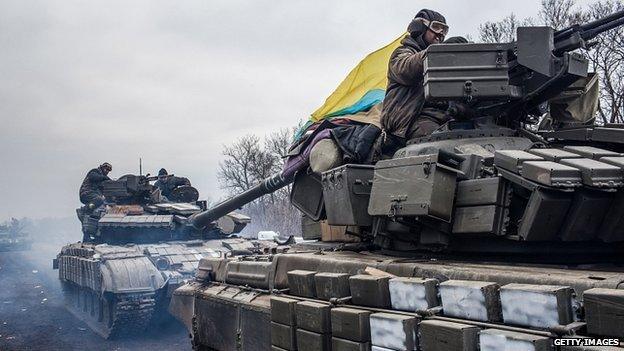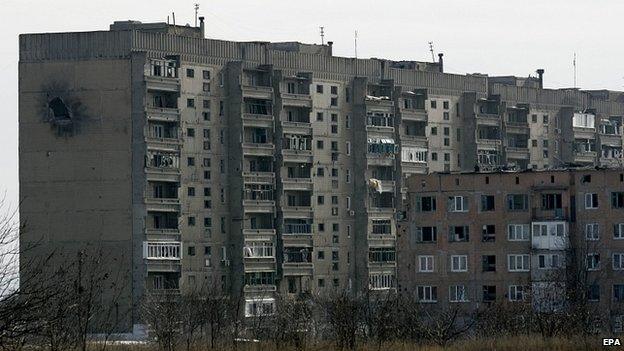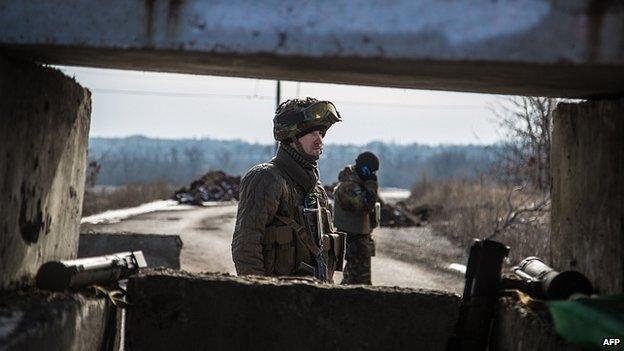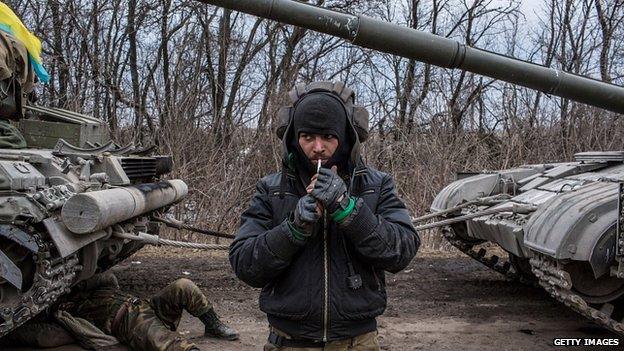Ukraine conflict: Truce violations 'deeply trouble' US
- Published

Ukrainian troops withdrew from Debaltseve after a fierce offensive by pro-Russian rebels
The US says it is "deeply troubled" by reports of fighting in eastern Ukraine despite the ceasefire agreement that came into effect on Sunday.
A White House spokesman called on all sides to abide by the commitments of the deal.
Shelling was reported from several areas on Thursday, including around the rebel-held city of Donetsk.
Nato's top military commander, Gen Philip Breedlove, said the ceasefire existed in name only.
Speaking in Kosovo, he said it was "concerning" that the town of Debaltseve had fallen to pro-Russian separatists on Wednesday.
He added that the capture of the town would allow the "Russian offensive" to move more freely through the region.
Debaltseve is a railway hub that links the two rebel-held cities of Luhansk and Donetsk.

Towns and villages around Debaltseve bear scars from the fierce artillery exchanges

The Ukrainian military accuses the rebels of breaching the ceasefire deal
Ukraine and the West accuse Russia of backing the separatists militarily, a claim the Kremlin strongly denies.
White House spokesman Eric Schultz called on Russia and other parties to honour the commitments in the ceasefire deal, agreed last week in Minsk.
"What was agreed to last week was not a shopping list," he said. "You don't get to decide which items you're going to abide by. Those were commitments made by all parties, and we expect them to keep their word."
US state department spokeswoman Jen Psaki said there would be costs if the violations persisted - a reference to talks in Washington about whether to impose tougher sanctions on Russia or start sending weapons to Ukraine.
However, Ms Psaki said the US was not looking for an escalation and the focus remained on supporting the implementation of the ceasefire.
Most of the renewed fighting in Donetsk appeared to be in the north of the city towards the airport.
The BBC's Paul Adams in eastern Ukraine said explosions were still being heard on the outskirts of Donetsk on Thursday night.
The BBC's Ian Pannell reports from the outskirts of Donetsk: ''We have been hearing the sound of shells going in and coming out''
Further south, the Ukrainian military reported rebel attacks on government positions around the strategic port city of Mariupol.
A spokesman said the rebels were bringing reserves into the area.
Mariupol, which is held by the government, sits between rebel-held eastern areas and Crimea, which Russia annexed nearly a year ago.
Rebel spokesman Eduard Basurin told Russian news channel Rossiya 24 that there were no plans to attack Mariupol.
"We are prepared to fulfil all the obligations that we undertook under the Minsk agreements and to fully follow the path that was set out there," he said.
The Organisation for Security and Co-operation in Europe (OSCE) - which is charged with monitoring the ceasefire - also reported more shelling near Debaltseve which observers have not been able to reach.

Heavy weapons have not yet been moved out of the agreed buffer zones, observers say
Under the terms of the ceasefire deal, both sides were to begin withdrawing heavy weapons beginning on Tuesday, but OSCE monitors said this did not seem to be happening.
"We have not observed the withdrawal of heavy weapons, however we have observed and reported on the movement of heavy weapons," said spokesman Michael Bociurkiw.
The leaders of Russia, Ukraine, France and Germany - who negotiated the ceasefire deal - discussed the crisis in a phone call on Thursday.
The French presidency said the leaders had called for "the implementation of the full package of measures agreed in Minsk" including a full ceasefire, withdrawal of heavy weapons and the release of prisoners.
In another development, Russian energy giant Gazprom said it had begun supplying gas directly to rebel-held parts of eastern Ukraine. It came after the Ukrainian government cut supplies to the east because of pipes damaged in the fighting.
Ceasefire from 00:01 on 15 February (22:01 GMT 14 February)
Heavy weapons to be withdrawn, beginning on 16 February and completed in two weeks - beyond a buffer zone behind the current front line for Ukrainian forces and behind the September front line for separatist forces
All prisoners to be released; amnesty for those involved in fighting
Withdrawal of all foreign troops and weapons from Ukrainian territory. Disarmament of all illegal groups
Ukraine to allow resumption of normal life in rebel areas, by lifting restrictions
Constitutional reform to enable decentralisation for rebel regions by the end of 2015
Ukraine to control border with Russia if conditions met by the end of 2015